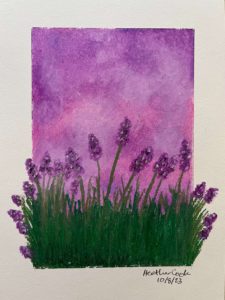Interacting with people
I’ve avoided plenty of social situations in my life, but I’ve never actually followed through with my fantasy of becoming a hermit in the woods.
In fact, throughout most of my life, I encountered people almost every day; via school, work, running errands, going to medical appointments or stores, groups I belonged to, phone calls or texting, etc. People have always been a part of my routines. Nowadays, that is more intentional and wanted, but in the past I just told myself it was because I didn’t have any choice. But I don’t think that’s giving myself enough credit.
For much of my life, I was criticized for not picking up on social nuances that other people expected me to, yet I kept engaging. Though most encounters were awkward, I still talked to people, and though I sometimes hated it, I was used to the discomfort, to how people reacted to me, and I endured. At best, people reacted differently to me than they did with others. It wasn’t necessarily negative, but it was different, and I noticed. I was different, and they knew it.
Miscommunication
For a few years, between bouts of burnout, I taught high school German. One of the most common reactions I get when I mention that is: “Oh, wow, that’s so hard! I could never do that!” I’ve gotten this reaction enough times, and questioned people about it enough, that I’ve noticed three main things that they are reacting to.
For some, the thought of teaching highschoolers is daunting (but I love the age group). For others, it is the stereotype that the German language is particularly daunting (but English is a Germanic language).
I think that’s because there’s a deep-seated fear in most of us […] of losing communication and feeling disconnected from others.
Yet the thing that most people seem to react to is the thought of learning a new language at all. Intimidation is an incredibly common response to language learning, no matter the language, and I think that’s because there’s a deep-seated fear in most of us of being unable to express yourself like you would in your native tongue. Of losing communication and feeling disconnected from others.
Autistic or not, humans generally have an aversion to situations where we can’t communicate comfortably. When I avoided dealing with social obligations until I couldn’t avoid it any longer, it wasn’t only because I’m Autistic, it’s because I’m human.
But because I am Autistic, I’ve had an extra generous serving of experiences in which being around people resulted in uncomfortable communication.
And because of that extensive history, I knew that I would get through them. I knew that being embarrassed wouldn’t kill me, despite sometimes wishing it would, and I endured.
A lot of allistics who socialize more easily are able to avoid situations which they find awkward or embarrassing. They, too, have miscommunications, and are excluded, and have the whole gamut of negative social experiences (because they generally aren’t as good at communicating as they think), but they can usually minimize those encounters. And when they do avoid them, they’re avoiding a minority of their social experiences.
For Autistics, that is most of our encounters, and so avoiding the awkward ones means avoiding most, or all, interactions with people.
Avoiding discomfort
My point is that this narrative that Autistics are socially avoidant, shy, withdrawn, antisocial, or whatnot, and therefore there’s something inherently wrong with us, is not true.
Autistics are not socially avoidant. People avoid discomfort. And people particularly avoid communication gaps.
We have a history of genuine experiences telling us that social encounters are, more often than not, going to be uncomfortable. And, like all reasonable humans, we avoid the thing that is uncomfortable. It’s not because we’re defective; we are responding entirely reasonably, and in the same way that everyone does, to painful situations.
So here’s what I hope you’ll take away from this: there’s nothing wrong with you. You’re a perfectly reasonable human being for avoiding things that are uncomfortable. That’s what humans do.
You are also incredibly brave for continuing to engage in this thing that you know is going to be uncomfortable.
You are also incredibly brave for continuing to engage in this thing that you know is going to be uncomfortable. A lot of neurotypicals don’t do that; they can usually avoid their minority of awkward experiences, and so stick to the ones they feel comfortable with.
The fact that you keep engaging over, and over, and over, is a testament to your bravery in discomfort.
When I was resigned to the fact that I would have to do this “social thing” over and over, I didn’t give myself credit for that. I guess I didn’t think I had a choice, but I did (I could have gone to a literal cabin in the woods, or opted out more permanently, and didn’t). Even though I got intensely avoidant, and barely left the house for months at times, I did keep trying over and over.
Until something changed. I figured out I was Autistic, and everything started to make much more sense.
Forging a new future
That kicked off a new set of possibilities for me. My history was no longer a determinant of my future. Now my history was the story of before I understood what was going on, and my future was a promise of a different direction.
When I started making changes, learning to unmask, learning to present myself differently, developing healthier and non-neurotypical conforming relationship skills, I started to engage differently. I was building out my Autistic social skills, and that opened up new possibilities for my future being different than the past. (It was still often awkward, but in different ways, and increasingly less so.)
And I let myself off the hook for all the years that I had hidden away from people, because there was nothing broken inside me after all. It was an entirely reasonable response to an unreasonable situation; I was expected to perform without ever getting decent instructions on how to do that, or in ways that made sense to me.
I let myself off the hook for all the years that I had hidden away from people, because there was nothing broken inside me after all.
The more I understood what had been going on, and experienced genuine connection with people in increasingly positive encounters, the more the shame and blame that I had heaped on myself for years faded away (along with the damaging narratives I had told myself).
I won’t pretend that everything is perfect now. That every encounter with people is sunshine and roses and unicorn farts. I still have miscommunications and misunderstandings, and things are awkward sometimes. But now that is more a minority of my experiences, and I feel better equipped to deal with them, to come to a positive resolution.
And I’m also better able to differentiate when the problem is with my side of the communication or with the other person. Because it isn’t, and never was, all on me.
My history of people being confused or mad at me, or upset with me, of complaining at what I said, and telling me off but without explaining why, or what to do about it, no longer has to determine my future.
It took time to unlearn the many damaging lessons I had been taught, to understand what was really going on, to let go of the shame and blame I had taken on, and get to a better mental and relational space. But I’m no stranger to uncomfortable and difficult tasks, and this one had much better prospects for a positive outcome. It was absolutely worth it.




